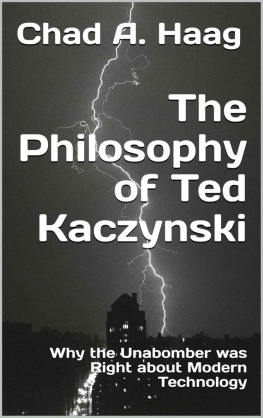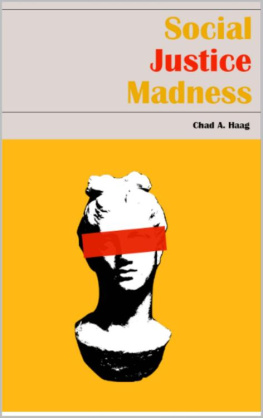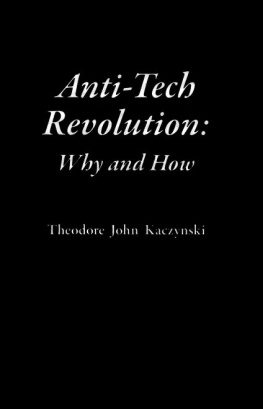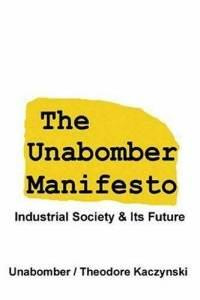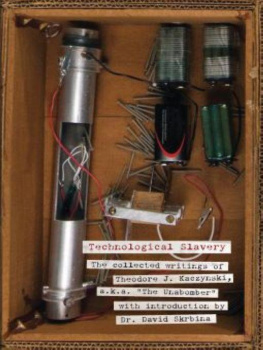The Philosophy of Ted Kaczynski:
Why the Unabomber Was Right about Modern Technology
Chad A. Haag
Uchakkada, India
2019
Table of Contents
Dedicated to Freedom Club
If our condition were truly happy, we would not have to divert ourselves from thinking about it. Blaise Pascal, Penses
In todays world a prerequisite for revolution most likely will be a situation... involving widespread anger, desperation, and hopelessness. Revolutionaries need to be capable of making use of such a situation. Ted Kaczynski, Anti-Tech Revolution: Why and How
Technique is essentially independent of the human being, who finds himself naked and disarmed before it. Modern man divines that there is only one reasonable way out: to submit and take what profit he can from what technique otherwise so richly bestows on him. If he is of a mind to oppose it, he finds himself really alone. Jacques Ellul, The Technological Society
It would be better to dump the whole stinking system and take the consequences. Ted Kaczynski, Industrial Society and Its Future
Chapter One:
The Revolution against Technology:
The Quest for the Objective Factor
Blowing the Competition Away?
Theodore John Kaczynski, popularly known as the Unabomber, is the single most underappreciated thinker of our era. Yet his neglect by the professional intellectuals of the academic industry and the state-controlled media has not stemmed from sheer ignorance of his existence, as though he were some obscure writer whose name was known only to a small handful of eccentric followers scattered in random locations across the globe. Rather, Kaczynskis work is ignored by the official gatekeepers of knowledge despite the fact that the Unabomber has had nearly universal name recognition for decades, if only through the biased lens of the medias portrayal of him as nothing more than a domestic terrorist. Worse still, although popular media productions on him are relatively abundant, they have almost exclusively amounted to theatrical reconstructions of the 17 year-long FBI manhunt or pseudo-biographical accounts of his battle with untreated mental illness. In either case, the very name Ted Kaczynski is trivialized, either into narratological material for an hour-long whodunit show to kill time on a lazy Sunday evening or into advertising material for a thinly-veiled infomercial for the pharmaceutical industry. What the spectator lying on the couch in a half-awake state is certain not to encounter in any of these media circus acts is his deadly-serious warnings about doing precisely that activity: an artificially-intelligent machine running a pre-recorded video distorting information on his biography and blocking out any mention of his theories about the danger of artificially-intelligent machines, especially in order to shamelessly peddle the very same toxic pharmaceutical drugs which he warned against in his writings, is irony itself, embodied in the confines of objectivity. It is not an exaggeration to say that he has paradoxically been the most overexposed thinker at the level of crass media attention and yet the most underexposed thinker in terms of actually doing justice to the substance of his philosophical ideas.
But what is this elusive Philosophy of Ted Kaczynski which remains all the more invisible to the general public despite the fact that most people have some sense, however vague, that the Unabomber opposed Modern Technology and tried to stop it from gaining even more control over our lives? To the nave viewer who assumes his goal was simply to abruptly stop technological progress, he would seem to have been a total failure, even if one did not factor in his multiple life sentences in prison. After all, Kaczynski wrote his Unabomber Manifesto Industrial Society and Its Future during the 1990s on a typewriter from a simple cabin he built with his own manual labour in the remote forests of Montana many years earlier; although he lamented the nearly-complete domination which Modern Technology had gained over humans in the Manifesto, he wrote in an era which might even seem relatively non-technologized compared to the present year of 2019. In the Manifesto, for example, electronic entertainment largely meant television and radio, media which seem quaint and innocuous compared to the nonstop flood of YouTube videos which are instantly available on a persons smartphone even when he or she is away from home, not to mention the mind-numbing ritual of wasting away countless hours of each day scrolling down a social media newsfeed populated by selfies, memes, and clickbait news article headlines. Kaczynski wrote in an era in which the internet, let alone smartphones with constant access to it, was a marginal service with relatively little influence over daily life. Today smartphones are a ubiquitous presence even among the homeless in the West and among slum-dwellers in the so-called Third World. To the nave viewer, Kaczynski would appear to be a madman whose few violent outbursts proved utterly incapable of stopping the inevitable forward thrust of progress. Worse still, the proliferation of gadgets among slum dwellers, rural villagers, and the homeless might seem to be a democratization of Modern Technologys benefits among those previously excluded from its influence; Kaczynskis attempts to halt this movement would therefore seem to be an affront against the global poor to whom the Technology Industry sought to beneficently extend their services in a grandiose politically correct gesture. Under this view, Kaczynskis theories would appear to be both disproven on empirical grounds and untenable on ethical grounds.
Although these thought-stoppers will pass for serious thinking even among the tiny handful of people bold enough to venture into the supremely forbidden territory of discussing the Philosophy of the Unabomber, such arguments depend upon leaving a fundamental ambiguity unresolved: what, exactly, is Modern Technology for Kaczynski? Without a clear definition of what he understood Modern Technology to be, it will be impossible to honestly interpret why he not only rejected using it in his own personal life but was allegedly willing to take violent action to prevent it from developing further for the rest of the human population as well. Without a proper understanding of this term, it will be impossible to understand how his goal was not to abruptly halt technological innovation so much as it was to build a revolutionary movement over a series of decades around a clear ideology rejecting Modern Technology and an appropriate strategy to transform society to a post-technological state. This is one question which the media has never asked. It is unclear whether this was due to wilful deceptiveness or gross incompetence, or perhaps some mixture of both, but the fact remains that the medias discussion of the infamous Unabomber is a priori ruled out as misleading, and ultimately irrelevant, due to their refusal to acknowledge this most central question of his philosophy.
Arguably, this neglect has stemmed from a genuine lack of interest in the Modern Technology aspect of Kaczynskis story. After all, the entrenched upper middle class aristocracy who hold positions as white-collar chair-warmers in the mainstream media so thoroughly take Modern Technology for granted that they would consider even raising a question about this energy-wasting, ecologically-unsustainable historical anomaly to be a symptom of an untreated mental illness. They certainly would never lower themselves to the stance of dignifying such an explosive outburst of madness by recognizing any genuine question there which merits a serious answer.
It is curious, for example, that arguably the single most widely-viewed media portrayal of Kaczynski makes no mention whatsoever of Modern Technology. Kaczynski is of course mentioned in the film Good Will Hunting during a conversation over the likely future of Will Hunting, a janitor at MIT who was accidentally revealed to be a mathematical genius. Despite the fact that Gerry, a high-ranking MIT professor, had agreed to mentor him, Will still refuses to take the ultimate opportunity that is handed to him and instead prefers to get drunk at local working class bars with his friends who lack his intellectual giftedness and do little to challenge him to meet his potential. Near the end of the film, Gerry speculates how history might have been different if Einstein had similarly consigned himself to a lazy life of bar-hopping:

